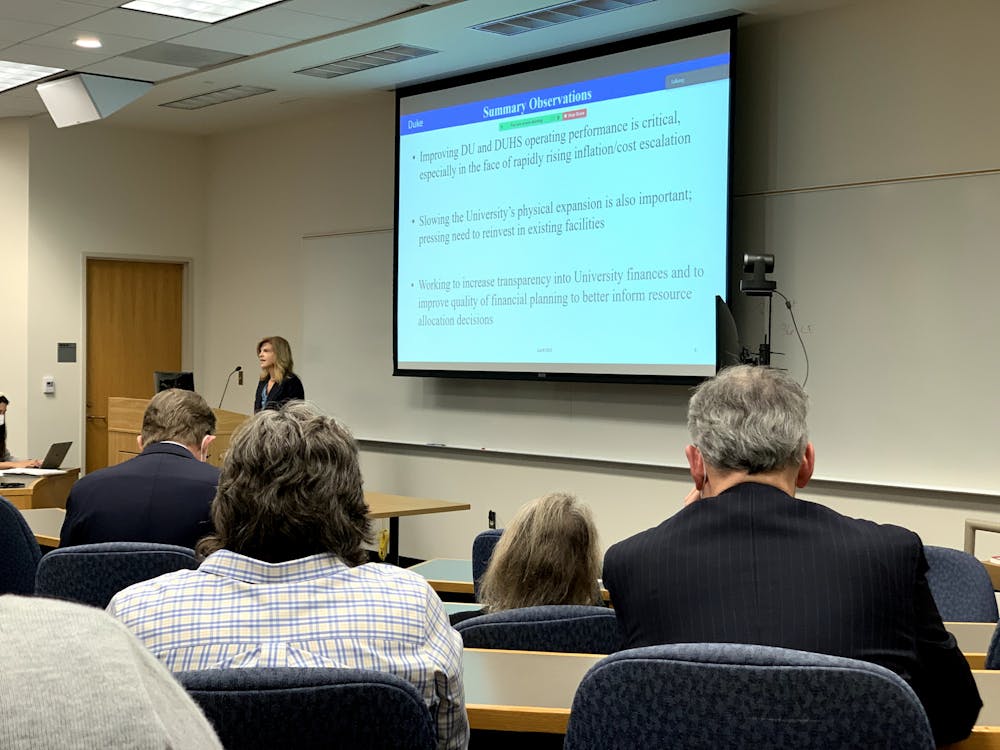The Academic Council heard a financial update about Duke and the Duke University Health System at their Thursday meeting.
Executive Vice President Daniel Ennis and Vice President for Finance Rachel Satterfield presented the financial interactions between the University and DUHS. They also answered questions about facing rising inflation and cost escalation, including raising employees’ salaries with the inflation rate.
According to Satterfield, the operating revenue for Duke’s 2021-2022 fiscal year was $8.4 billion. About a third of the operating revenue relates to the University, with the remaining amount relating to Duke’s clinical mission, she said.
“In general, we are in a very healthy place,” Satterfield said.
Satterfield added that the University’s operating performance, which is calculated by subtracting operating expenses from revenue, has stabilized, although she is not certain whether this is “short-lived or fragile.”
DUHS’ operating performance “continues to be a challenge” and is particularly important to her because the School of Medicine relies on funding from DUHS.
Faculty on the Council asked about how the rest of the University would be impacted by DUHS’s operating performance.
“I've heard that when the health system sneezes, the University gets the flu,” said Professor of Romance Studies Deborah Jensen.
Ennis agreed that the rest of the University has been “a great beneficiary of the health system’s financial performance over time.” His response focused on the cause of the health system’s financial issues, saying that there is an unsustainable rate of growth in patients and in healthcare expenditure.
“We have smart leadership and they'll chart the path through this,” he added.
While the operating margins for the University and DUHS have stabilized, Satterfield has said that a trend in three of the past five years has been expenses outpacing revenue. Her team is projecting a slight surplus for the 2022-2023 fiscal year, but expenses are getting very close to outpacing the revenue growth again, she said.
“Focusing on improving the operating performance for both the health system and for the University will be critical, especially in the face of the rising inflation and cost escalation,” Satterfield added.
Employee salaries amid rising inflation
Campbell Harvey, J. Paul Sticht distinguished professor of international business in the Fuqua School of Business, asked how many employees were getting compensation that matched the inflation rate. In an October Academic Council meeting, Harvey asked how many employees' salaries matched the inflation rate when it was 5.4%.
“Today [the inflation rate is] 8.5%. How is that affecting our finances, and is there a contingency to potentially help out some employees?” Harvey asked.
According to Ennis, raising employee salaries at the rate of inflation is an incredibly hard problem and a structural pressure point that is “inescapable.”
“The structural dimension of it for us is we do not pass on those costs,” Ennis said. “We're not about to turn around and raise tuition at the rate of inflation. And so our funding sources will not manage the pace of inflation.”
Ennis also pointed towards ways in which the University has adjusted some salaries, including the recent raise in minimum wage, but did not want to “mislead people” into thinking the University would be able to close the employee salary gap.
University debt
The amount the University owes is currently at $2.7 billion—Duke’s debt spiked between 2019 and 2020. The increase in debt was in response to the COVID-19 pandemic, Satterfield said.
Get The Chronicle straight to your inbox
Sign up for our weekly newsletter. Cancel at any time.
“We took out additional debt of $600 million. And we did that at the beginning of the pandemic,” Satterfield said. “We needed liquidity cash, we needed to be able to make sure that if we had risk around our revenue streams…in order for us to be able to manage the enterprise for a period of time we needed cash in hand.”
This amount of debt means the University does not “have the capacity to borrow any more debt,” according to Scatterfield.
Satterfield added that this would impact the funding structures for capital innovations, such as construction projects. She added that gross square footage has increased over the past few years, which to her, is an “unsustainable path,” noting the “ongoing operating expenses” of adding buildings. Instead, the University will prioritize “campus renewal.”
The council concluded the meeting by discussing conferral of honorary degrees for 2023 commencement in an executive session closed to the press.
Correction: An earlier version of this article incorrectly stated that Harvey said that 5.4% of Duke employees’ salaries matched the inflation rate in October. It has been updated to reflect that in October, Harvey asked how many Duke employees' salaries matched the 5.4% inflation rate. The Chronicle regrets the error.

Adway S. Wadekar is a Trinity junior and former news editor of The Chronicle's 119th volume.

